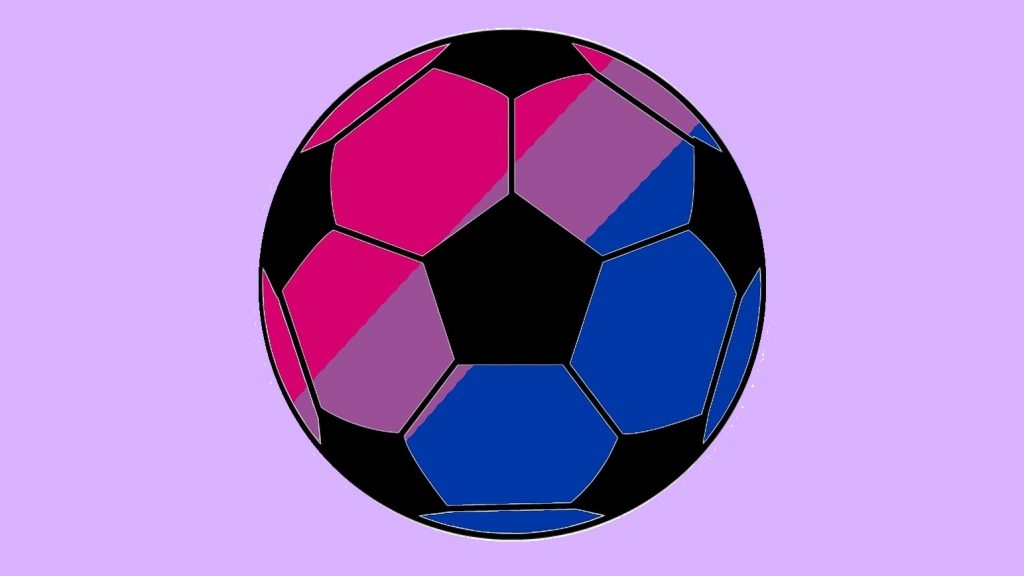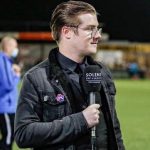Broadcasting, Blackburn, and Bi Visibility Day: Listen to the FvH Podcast
To mark the annual awareness day on September 23, Football v Homophobia Youth Panel comms officer Sam Clarke joins his fellow Sports Media LGBT+ network member Michael McCann and Proud Rovers founder Hannah Parys for a chat about their experiences of being bi and out…


During last year’s annual activation of the Stonewall campaign, sports commentator and journalist Michael McCann posted a picture of his Rainbow Laces to his social media accounts, alongside a powerful message about the importance of visible representation.
On a new episode of the FvH Podcast issued to mark Bi Visibility Day, Michael – who can often be heard broadcasting on football for BT Sport, IMG and the WSL – explains why he wanted to share those posts in December 2020.
“I work in both women’s and men’s football, and there’s a chasm between the two on diversity, particularly LGBTQ+ stuff,” he says.
“Growing up, I had no real role models to speak of at all. That played a part in why I came out in such an open and public way when I did.”
McCann is a guest on the podcast alongside Hannah Parys, the founder of Blackburn’s LGBTQ+ supporters group Proud Rovers. Hosting the conversation is Sam Clarke, who wrote his own blog for Bi Visibility Day 12 months ago for Sports Media LGBT+ – Sam is a freelance journalist and as well as looking after comms for the Football v Homophobia Youth Panel, he’s vice-chair of Charlton’s LGBT+ fans group Proud Valiants.
The trio met up via Zoom to discuss bisexuality, their identities related to that, and their roles within football.
Hannah, whose day job is working for a recruitment company, agrees with Michael that a lack of role models in the 1990s and 2000s impacted her – and even though that’s getting better in various parts of society, the lack of visibility in men’s football is still having an effect because the game is so influential and followed by millions around the world.

“Growing up, you think there’s something wrong with you,” says Sam, referring back to a theme he explored in his 2020 blog. “There’s not a set relationship for bi identities – that plays into the lack of visibility, because it’s not as easy to notice as with gay or lesbian couples.”
Michael reflects on some of the common attempts at jokes he’s heard down the years, and how exhausting it can be to explain what it means to be bisexual. “People say things like, ‘I’ll stop trying to find a nice girl for you’ or ‘those girlfriends were a waste of time then’ – the trope is that you’re gay but you don’t want to tell them or are heading there slowly.
“I think it’s why we’re less likely to see male athletes come out as bi because they’ll feel they’re going to get told that they’re gay but just can’t admit it.”
Coming out as bi in sports media has been “overwhelmingly positive” for McCann but has certainly not been without its challenges. One person he worked with made a bad joke about being bisexual while they were on air together. On the podcast, he also describes how friends he trusts in the industry have told him what’s been said by others when he’s not around.
“I had six and a half years of being a freelance broadcaster before I came out and even then, in the year since, a few different people have said to colleagues of mine, ‘oh he came out because he needed to get more work because he wasn’t getting enough freelancing’.
“Another suggested it was ‘to get thousands of social media followers from the LGBT+ community overnight so he could become better known’, or simply ‘to get attention’. All that leaves you very uncomfortable when you’re working on a shift with someone who you know has said that about you.”

Working in recruitment, Hannah is fully conscious of how comments such as these inhibit people in the workplace and says she has felt it herself on occasions. “I still hold part of me back sometimes.
“People saying things in the past like ‘choose a team’ has made me more confused… you can get into a spiral of mental health issues. It’s never straightforward coming out as bi.”
Proud Rovers started out at the end of July 2019 – they are part of the Pride in Football family of LGBT+ supporters groups and also affiliate members of the Football Supporters’ Association. “I love going on matchdays, I love the atmosphere – even if Rovers lose, it’s a fun day out.
“But I’d also be thinking that there are going to be people who don’t feel able to enjoy these things, for fear of discrimination. If Proud Rovers helps even one person, it’ll be worth it.”
In his social posts nine months ago, Michael wrote: “I grew up in a household where homophobia was sadly rampant, leaving me in fear of my own identity.” In the podcast, he expands on what that environment felt like, and how a close friend helped him find the right words when space was short due to the character count.
Later that same day in December, he went to play his regular game of five-a-side with friends in west London where he has always worn Rainbow Laces in his boots. “I posted to Twitter and Instagram and there was this wave of anxiety.
“I turned up for football and a couple of the guys had seen it – ‘we’re chuffed for you’, they said, and hugged me, reminding me ‘you know it doesn’t change anything’.
“I felt like I was floating, it felt so good. And I played really well in this one-hour game – I just couldn’t stop scoring. It became a joke that I should have done it years ago! I‘ll never forget that day. Because of what happened before the game, I just felt so free.”
Michael also talks about finding his place at Graces Cricket Club – where he is “a part-time wicketkeeper and batsman who never scores any runs”. He co-commentated with Bob Ballard on their historic game in August against Birmingham Unicorns, which was supported by the ECB. “It’s a cricket club that’s incredibly diverse and accepting.”
The trio wrap up the chat with their advice to others who are bisexual and who might be navigating their own way towards being visible. “Surround yourself with the right people,” says Hannah, while Michael stresses the importance of valuing yourself highly and how it can boost your mental health.
Sam hopes the conversation will help with further education in football and football media.
“Try not to let people’s ignorance and inability to comprehend what bisexual attraction is affect you,” he says. “Don’t let that force you into defining yourself any more than you want to.”
A big thank you to Sam and all our friends at Football v Homophobia for this collab, and to Michael (above image courtesy of Diana Oros) and Hannah for your time and openness. And to all celebrating Bi Visibility Day – we salute you!
Remember to listen to the FvH Podcast – you can find it on iTunes, Spotify and other platforms.
Also, on the FvH YouTube channel, check out a new episode of Google Assumptions for Bi Visibility Day as Sam is joined by Angharad Englefield Nelson and Sheppey United’s Jahmal Howlett-Mundle…
Sports Media LGBT+ is a network, advocacy, and consultancy group that is helping to build a community of LGBT+ people and allies in sport. We’re also a digital publisher. Learn more about us here.
LGBT+ in sports? Your visibility will inspire other people – sharing your story can be hugely rewarding and you don’t have to be famous to make a positive and lasting impact. We encourage you to start a conversation with us, in confidence, and we’ll provide the best advice on navigating the media as part of your journey so that you retain control of your own narrative.
Email jon@sportsmedialgbt.com or send a message anonymously on our Curious Cat.


